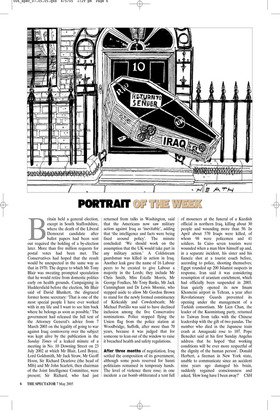PORTRAIT OFTHE WEEK B ritain held a general election, except in
South Staffordshire, where the death of the Liberal Democrat candidate after ballot papers had been sent out required the holding of a by-election later. More than five million requests for postal votes had been met. The Conservatives had hoped that the result would be unexpected in the same way as that in 1970. The degree to which Mr Tony Blair was sweating prompted speculation that he would retire from domestic politics early on health grounds. Campaigning in Huddersfield before the election, Mr Blair said of David Blunkett, the disgraced former home secretary: ‘That is one of the most special people I have ever worked with in my life and I want to see him back where he belongs as soon as possible.’ The government had released the full text of the Attorney General’s advice from 7 March 2003 on the legality of going to war against Iraq; controversy over the subject was kept alive by the publication in the Sunday Times of a leaked minute of a meeting in No. 10 Downing Street on 23 July 2002 at which Mr Blair, Lord Boyce, Lord Goldsmith, Mr Jack Straw, Mr Geoff Hoon, Sir Richard Dearlove (the head of MI6) and Mr John Scarlett, then chairman of the Joint Intelligence Committee, were present; Sir Richard, who had just returned from talks in Washington, said that the Americans now saw military action against Iraq as ‘inevitable’, adding that ‘the intelligence and facts were being fixed around policy’. The minute concluded: ‘We should work on the assumption that the UK would take part in any military action.’ A Coldstream guardsman was killed in action in Iraq. Another leak gave the name of 16 Labour peers to be created to give Labour a majority in the Lords; they include Mr Chris Smith, Miss Estelle Morris, Mr George Foulkes, Mr Tony Banks, Mr Jack Cunningham and Dr Lewis Moonie, who stepped aside to allow Mr Gordon Brown to stand for the newly formed constituency of Kirkcaldy and Cowdenbeath; Mr Michael Portillo was said to have declined inclusion among the five Conservative nominations. Police stopped flying the Union flag from the police station at Woodbridge, Suffolk, after more than 70 years, because it was judged that for someone to lean out of the window to raise it breached health and safety regulations.
After three months of negotiation, Iraq settled the composition of its government, although some posts reserved for Sunni politicians remained in temporary hands. The level of violence there rose; in one incident a car bomb obliterated a tent full of mourners at the funeral of a Kurdish official in northern Iraq, killing about 30 people and wounding more than 50. In April about 570 Iraqis were killed, of whom 98 were policemen and 41 soldiers. In Cairo seven tourists were wounded when a man blew himself up and, in a separate incident, his sister and his fiancée shot at a tourist coach before, according to police, shooting themselves; Egypt rounded up 200 Islamist suspects in response. Iran said it was considering resumption of uranium enrichment, which had officially been suspended in 2003. Iran quietly opened its new Imam Khomeini airport in Tehran, a year after Revolutionary Guards prevented its opening under the management of a Turkish consortium. Mr Lien Chan, the leader of the Kuomintang party, returned to Taiwan from talks with the Chinese leadership with the gift of two pandas. The number who died in the Japanese train crash at Amagasaki rose to 107. Pope Benedict said at his first Sunday Angelus address that he hoped ‘that working conditions will be ever more respectful of the dignity of the human person’. Donald Herbert, a fireman in New York state, unable to communicate since an accident nine years ago damaged his brain, suddenly regained consciousness and asked, ‘How long have I been away?’ CSH



























































 Previous page
Previous page